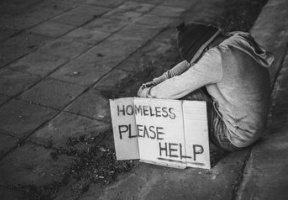Courtesy of Coalition for the Homeless
 A new report from the Chicago Coalition for the Homeless (CCH) estimates 68,440 Chicagoans experiencing homelessness at the beginning of 2022. This reflects a 2,829-person increase from the previous year—up 4.30 percent. This estimate is inclusive of more than 44,000 people experiencing an often-hidden form of homelessness: doubling up or temporarily staying with others. Homelessness is not one-size-fits-all and there are many ways one person can experience it. Someone may sleep in a shelter, on the street, at a train station, and double up with others all in one week. All these living situations should be considered homeless. In 2022, Chicago tallied 3,875 people experiencing street and shelter homelessness. The Point-in-Time count tallies people experiencing street and shelter homelessness on a designated night of the year—usually every January. The Department of Housing and Urban Development does not include people doubling up with friends and family who are considered homeless and therefore is not counting them in their annual estimates and does not include them in who is eligible for housing. CCH developed a method of estimating homelessness using American Community Survey data that includes those living doubled-up.
A new report from the Chicago Coalition for the Homeless (CCH) estimates 68,440 Chicagoans experiencing homelessness at the beginning of 2022. This reflects a 2,829-person increase from the previous year—up 4.30 percent. This estimate is inclusive of more than 44,000 people experiencing an often-hidden form of homelessness: doubling up or temporarily staying with others. Homelessness is not one-size-fits-all and there are many ways one person can experience it. Someone may sleep in a shelter, on the street, at a train station, and double up with others all in one week. All these living situations should be considered homeless. In 2022, Chicago tallied 3,875 people experiencing street and shelter homelessness. The Point-in-Time count tallies people experiencing street and shelter homelessness on a designated night of the year—usually every January. The Department of Housing and Urban Development does not include people doubling up with friends and family who are considered homeless and therefore is not counting them in their annual estimates and does not include them in who is eligible for housing. CCH developed a method of estimating homelessness using American Community Survey data that includes those living doubled-up.
Estimate Highlights:
• Black and African American Chicagoans continue to disproportionately experience homelessness. Black and African American Chicagoans account for 53 percent of all people experiencing homelessness while making up only 29 percent of the city’s total population.
• Hispanic and Latino/a/e/x Chicagoans far more often experience homelessness by couch-surfing. Of all Hispanic and Latino/a/e/x Chicagoans experiencing homelessness, 91 percent are in doubled-up situations.
What is the solution?
To address the lack of housing resources for households living doubled-up, CCH developed the Bring Chicago Home campaign to create a local, dedicated revenue source for housing. With flexible local funding, the city can provide housing for the full scope of people experiencing homelessness. For the past two months, housing advocates from the Bring Chicago Home coalition have been working with the Johnson Administration to land on a proposal that would raise the real estate transfer tax on high-end property sales and dedicate that to fund permanent housing and wraparound services – a step to addressing Chicago’s homelessness crisis.











